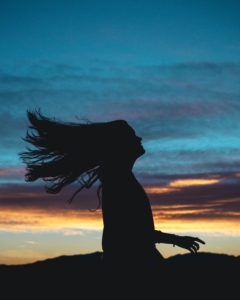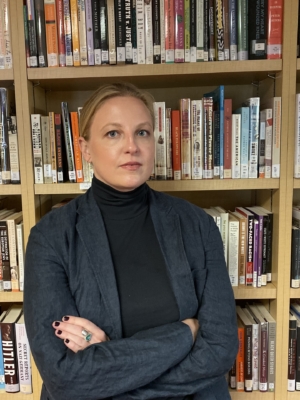What Will Become of the Millennial Wild Woman?
When I was fifteen, a family friend told me: “As a woman, you either choose your career or your children first.” She suggested children first because a career did not have an age limit. Tearful, she said, “I chose wrong and waited until it was too late.” She was part of the first generation of women who had this choice. I shrugged off her lament with youthful pity, confident I would have both. I was raised with the assumption that university would develop my direction and lead to a career. I was told the neoliberal dream to follow my interests, thinking they would equate to an income and love would result in a family. Now, at thirty-seven, three graduate degrees later, a six-figure student loan debt, no clear career and no child in sight, I have been feeling that woman was right.
Turning this age felt heavy. Fertility begins to decline at thirty-two, and at age thirty-six a woman’s egg supply diminishes exponentially, so that at forty, less than 3% of pre-birth eggs remain. To gain perspective, I talked to my doctor through the Medi-Cal system, and he arranged to get me approved to have my fertility tested. At the clinic, I was reminded there are limitations for what Medi-Cal can offer in fertility assistance. If I need IVF, I would have to go to a private clinic, and there are risks involved in “geriatric pregnancies,” any woman thirty-five years of age or older who is with-child. Overwhelmed by being referred to as geriatric, I felt like I was in a ridiculous comedy sketch about a woman in Los Angeles approaching middle-age, ensnared in an identity crisis. The whiplash from this quick turnaround— youth to geriatric— seems increasingly present in my life. I am older than people who interview me for jobs I apply to as a “recent graduate.” Not having financial stability, I feel I haven’t even made it to adulthood, let alone nearing menopause. My outer woman struggles to have a purpose, but inside I have never felt more capable. I’m panicked. I feel trapped in my body.
In my early twenties, I read the book Women Who Run with the Wolves, which stories the “Wild Woman Archetype.” The author, Dr. Clarissa Pinkola Estés, deconstructs ancient myths and fairy tales from different cultures about Wild Women and calls for a return to Wilderness— both of which are becoming extinct. This inspired me to embrace wildness through fierce independence. I moved to Beijing at seventeen and spent my early twenties in Paris, not conforming to expectations of me, hungry for adventure. After my fertility appointment (and many invasive tests), I picked up the book again in hopes it might provide guidance. Instead, I felt lost, afraid, and vulnerable as I skimmed through the pages. My perception had completely changed. The myths contained so many references to motherhood and youth that I began to question my power. How much power could I have if I am not able to have a child or embody wildness— especially if it is based on something as meaningless as money? I told myself strong women wouldn’t let that get in the way of a primal desire. I felt suffocated by womanhood and detached from Wildness.
There is a section I did not remember about the duality of women. Dr. Estés wrote that women are in fact two women at once. The outer woman and the inner woman (which she refers to as the criatura). The outer woman is rational. The inner woman is primal. Dr. Estés emphasizes that it is necessary to develop both women and function as a whole because, “If a woman hides one side or favors one side too much, she lives a very lopsided life.” This is how I feel now, very lopsided. I’ve spent twelve years trying to figure out a career, while struggling to make ends meet in jobs that had nothing to do with my education. The recession, losing my father soon after, and moving to Los Angeles in 2012 might have contributed to this stunted, lopsided situation. But maybe it is also that this regulated world— women in the workforce juggling when it is right to have children if at all, work and social life based on virtual platforms and interactions, a lack of adequate maternal and childcare for all but the elite— is so far removed from Wildness. It is hostile to the criatura of both the younger traveler and the older would-be mother. So many of us are paralyzed because we haven’t figured out a way to have either a family or a career.
As I was writing this, I saw a CNBC article about the first Millennials turning forty this year and stories about Middle-Aged Millennials who regret student loans because their degrees did not pay off. Having substantial student loan debt and graduating from my first master’s degree in 2008, in a field that was obliterated by the recession, I related to this line: “Older millennials entered adulthood around the time of the 2008 financial crisis, which was followed by higher education funding cuts, rising college costs and slow wage growth. The result: Millennials became the student debt generation.” I don’t necessarily regret my degrees (because they gave me a wealth of knowledge). I regret the assumptions I made that they would eventually pay off and I would have financial security and be able to have a family. They have not led to a higher income, and I can’t have a child if I don’t have a stable income that affords fertility assistance, childcare, and all of the needs for a child to be safe. My criatura is scratching at me to have a child before it’s “too late,” while my outer woman is reentering the workforce again after graduating with another degree in 2020 in a pandemic economy. The two women are in opposition. Torn between biology and economics, I’m left confused and disappointed, my inner and outer women having not evolved into the balance necessary to take on a woman’s existence today.
Speaking to this era of womanhood, Dr. Estés wrote: “There is a time in our lives, usually in mid-life, when a woman has to make a decision – possibly the most important psychic decision of her future life – and that is, whether to be bitter or not. Women often come to this in their late thirties or early forties. They are at the point where they are full up to their ears with everything and they’ve ‘had it’ and ‘the last straw has broken the camel’s back’ and they’re ‘pissed off and pooped out.’ Their dreams of their twenties may be lying in a crumple. There may be broken hearts, broken marriages, broken promises.” Perhaps Dr. Estés contradicts herself here in writing that the rational brain has control over the emotional body and makes a psychic decision alone, without the mercurial criatura. Maybe the criatura will be sad and angry that the outer woman decided her destiny? Will the outer woman once again decide how the inner woman should feel?
Personally, I’m finding being this age more difficult than I thought it would be, and I am only at the very beginning. I never imagined being the stereotype of a woman trying to figure out children later in life. I never imagined being so far from where I hoped I would be. I am not sure it is as simple as a conscious choice to just not be bitter. I think there are complicated and recurring reminders for an aging woman in society that change over time (and differ greatly from men). I do not know what the future will look like for me, but I do know that I desire to be a mother and have meaningful work, and I hope by going back to my inner Wildness, I will achieve both.
Franz is an urban sustainability practitioner and Antioch University MFA graduate. With an international background and previous masters’ in urban design, she concentrates her writing on how cities impact the psyches of citizens. She lives in Los Angeles.






